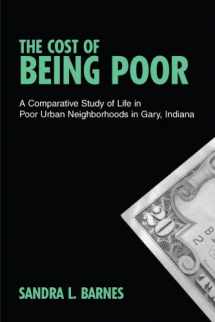
The Cost Of Being Poor: A Comparative Study Of Life In Poor Urban Neighborhoods In Gary, Indiana (S U N Y Series on the New Inequalities)
ISBN-13:
9780791464687
ISBN-10:
0791464687
Author:
Sandra L. Barnes
Publication date:
2005
Publisher:
State University of New York Press
Format:
Paperback
292 pages
Category:
Poverty
,
Social Sciences
,
Urban
,
Sociology
FREE US shipping
Book details
ISBN-13:
9780791464687
ISBN-10:
0791464687
Author:
Sandra L. Barnes
Publication date:
2005
Publisher:
State University of New York Press
Format:
Paperback
292 pages
Category:
Poverty
,
Social Sciences
,
Urban
,
Sociology
Summary
The Cost Of Being Poor: A Comparative Study Of Life In Poor Urban Neighborhoods In Gary, Indiana (S U N Y Series on the New Inequalities) (ISBN-13: 9780791464687 and ISBN-10: 0791464687), written by authors
Sandra L. Barnes, was published by State University of New York Press in 2005.
With an overall rating of 4.1 stars, it's a notable title among other
Poverty
(Social Sciences, Urban, Sociology) books. You can easily purchase or rent The Cost Of Being Poor: A Comparative Study Of Life In Poor Urban Neighborhoods In Gary, Indiana (S U N Y Series on the New Inequalities) (Paperback) from BooksRun,
along with many other new and used
Poverty
books
and textbooks.
And, if you're looking to sell your copy, our current buyback offer is $8.04.
Description
Looks at the daily lives of poor people to demonstrate that the poor pay more than others, by both monetary and other measures, to meet basic needs.
While the negative effects of urban poverty are well documented, the everyday experiences of urban residents are often absent or secondary in urban studies research. The Cost of Being Poor rectifies this problem by examining both the noneconomic and the often-overlooked economic costs faced by residents of poor urban neighborhoods in Gary, Indiana. Using census, regional, and local data, and in-depth interviews with the residents of Gary, Sandra L. Barnes argues that many people incur costs resulting from the dual dilemma of being poor and residing in a poor urban area. She explores how factors such as race/ethnicity, neighborhood type, and location influence residents’ views, coping strategies, and unconventional approaches toward making ends meet. Well written and accessible, this study of Gary’s poor urban neighborhoods offers broad findings that apply to other similarly impoverished Rust Belt cities.
While the negative effects of urban poverty are well documented, the everyday experiences of urban residents are often absent or secondary in urban studies research. The Cost of Being Poor rectifies this problem by examining both the noneconomic and the often-overlooked economic costs faced by residents of poor urban neighborhoods in Gary, Indiana. Using census, regional, and local data, and in-depth interviews with the residents of Gary, Sandra L. Barnes argues that many people incur costs resulting from the dual dilemma of being poor and residing in a poor urban area. She explores how factors such as race/ethnicity, neighborhood type, and location influence residents’ views, coping strategies, and unconventional approaches toward making ends meet. Well written and accessible, this study of Gary’s poor urban neighborhoods offers broad findings that apply to other similarly impoverished Rust Belt cities.


We would LOVE it if you could help us and other readers by reviewing the book
Book review

Congratulations! We have received your book review.
{user}
{createdAt}
by {truncated_author}


